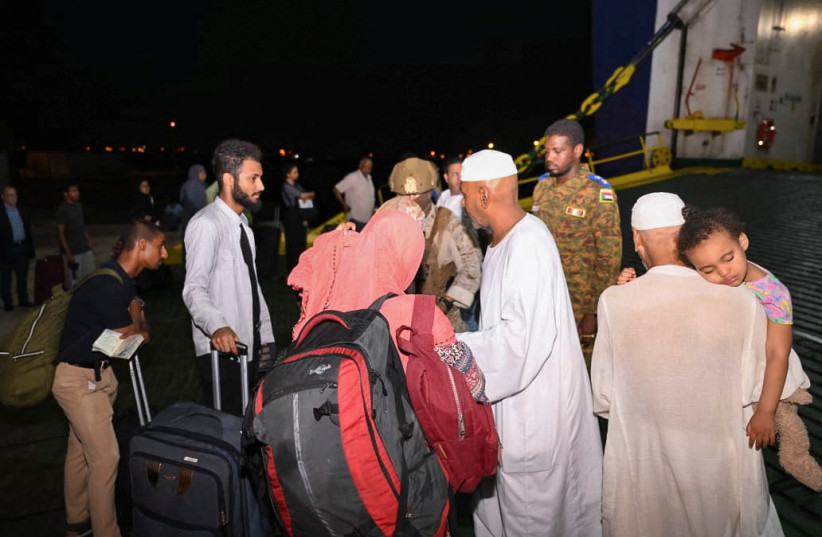[London] As the warring factions in Sudan continue to engage in urban warfare in the capital city of Khartoum, the pressure is rising on neighboring North African countries and on Europe to accept refugees fleeing the conflict.
For more stories from The Media Line go to themedialine.org
Omer Abdel Aziz, a British national and former journalist for the BBC Arabic Service who spoke exclusively to The Media Line about his experience fleeing Sudan, said that he expects many Sudanese to leave the country and that he fears a widespread refugee crisis.
“At the moment most people are fleeing internally or heading to Egypt, but if the numbers increase and fighting escalates, it will be a terrible humanitarian crisis for Sudan and the world,” he said.
“At the moment most people are fleeing internally or heading to Egypt, but if the numbers increase and fighting escalates, it will be a terrible humanitarian crisis for Sudan and the world.”
Omer Abdel Aziz
What happened in Sudan?
Fighting broke out in Sudan more than two weeks ago between the Sudanese Armed Forces, led by Gen. Abdel Fattah al-Burhan, and the paramilitary Rapid Support Forces (RSF), led by Gen. Mohamed Hamdan Dagalo.
Burhan and Dagalo, both with powerful foreign backers, were allies in an October 2021 military coup that halted Sudan’s fraught transition to democracy, but they have since turned on each other.

Abdel Aziz, 52, described the sudden eruption of war during a family visit that he, like many other British nationals, had taken to celebrate the Muslim holiday of Eid al-Fitr and the end of Ramadan.
“When fighting started on April 15, I thought it would be over quickly, as the army has much better equipment than the RSF, and they have an air force. But after five days without electricity, it was clear to me that this war was not going to end soon and I had to leave back to Britain,” Abdel Aziz said.
He left his home in southern Khartoum and headed to Wadi Seidna Air Base north of the capital during one of the temporary ceasefires. The British government had ordered all British nationals to come to the air base for evacuation flights to the UK.
Getting to the air base involved eight separate buses and a walk of more than 6 miles in 104-degree heat, Abdel Aziz said.
Raga Ahmed, 38, was another British national who had come to Sudan to celebrate Eid with her family. She had traveled with her 15-year-old brother and her 70-year-old mother, who uses a wheelchair.
“On April 15, it was a normal day for us, and we were getting ready to celebrate, but suddenly we heard a big gunfight outside our house,” Ahmed told The Media Line. “One of my family members came in and told me this area is being targeted by the Sudanese military.”
She had been staying with her family on the outskirts of southern Khartoum near an RSF base. For days, intense shelling and gunfire prevented the family from leaving the house.
“We were staying in one room in the back of our house, as we did not have a basement. There was shooting and shelling day and night and we could not get outside food,” she said. She told of the friend of an uncle who was killed after leaving the house to buy bread for his children.
After a brief lull in the fighting, Ahmed decided to make the journey to Wadi Seidna Air Base for the evacuation flights together with her mother and brother.
“We had to leave,” she said. “My mother is not very well and needed some blood pressure medicine, but we could not find anything. All the pharmacies, all the hospitals, were shut.”
After reaching the central bus station in Khartoum and sleeping there for a night, Ahmed and her family managed to find transport to the air base. There, they boarded a plane back to the UK via Cyprus.
According to the United Nations, more than 100,000 people have fled Sudan since the fighting broke out. UN officials warned of a “full-blown catastrophe” if the fighting does not end.
A series of temporary cease-fires have failed to hold, with the military continuing to pound Khartoum with air strikes in a bid to weaken the RSF. Meanwhile, food, water, medical supplies, and electricity are running out in the capital.
In a statement to The Media Line, Doctors Without Borders, known by its French initials MSF, said that the fighting has prevented them from delivering medical supplies to Khartoum.
“Our association is trying to supply additional hospitals and facilities within the capital—however, the fighting is continuing to make this almost impossible,” MSF Country Director for Sudan Ghazali Babiker said in the statement.
MSF operates medical faculties across the country, but the fighting has forced some of their staff to evacuate the country or to relocate to an MSF base in Wad Madani, south of the capital, Babiker said.
Abdel Aziz said that the situation will likely continue to deteriorate unless the warring sides reach a peace agreement.
“Many Sudanese—those who can afford—are heading to Egypt now. At the moment Sudanese can cross the border visa-free, but I fear that the Egyptian authorities will shut the border if the numbers increase, which will be terrible for those trying to escape the fighting,” he said.
Western Europe is already accepting an increasing number of refugees fleeing other conflicts, such as those in Libya, Chad, and Ukraine. If the war in Sudan continues, many Sudanese refugees are likely to seek asylum in Europe as well.
“I think many Sudanese will try to make the dangerous journey across the Mediterranean to Europe,” Abdel Aziz said. “We need help. We need Europe to open its hearts and borders to the Sudanese. Europe is helping Ukrainians. The Sudanese are just as important. Humanity is humanity, and we need help.”
